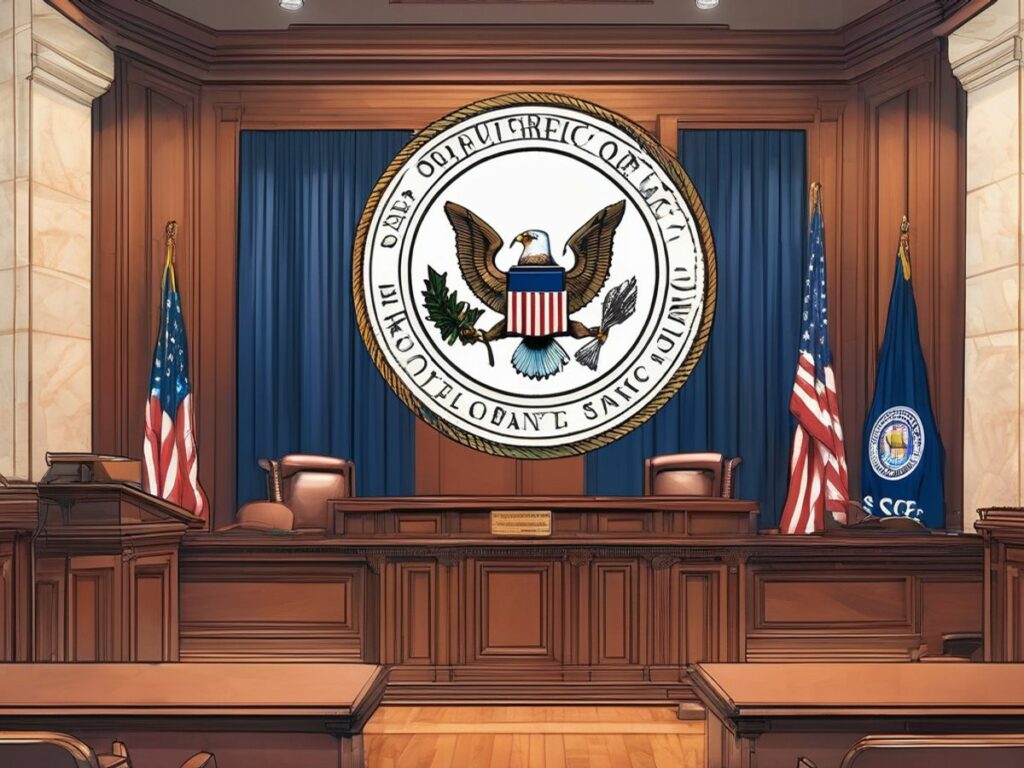In 2023, the U.S. Securities and Exchange Commission (SEC) initiated lawsuits against the world’s three largest crypto exchanges – Binance, Coinbase, and Kraken – marking the beginning of a stringent regulatory era for the crypto industry. These legal actions have significant implications for the future of cryptocurrencies and their regulation in the United States.
Key Takeaways
- The SEC has filed lawsuits against Binance, Coinbase, and Kraken, accusing them of various regulatory violations.
- The lawsuits could transform the crypto market by asserting the SEC’s jurisdiction over the industry.
- The SEC has identified several cryptocurrencies as securities, which could lead to stricter regulations and potential delistings.
SEC vs. Binance: Accusations and Responses
On June 5, 2023, the SEC filed a lawsuit against Binance, accusing the exchange of running an unregistered exchange, selling Binance-owned cryptos BNB and BUSD, offering staking programs, misrepresenting investor protection controls, and using customer funds for its own interests. The SEC is also investigating whether Binance had a “backdoor” to control assets on its U.S. platform.
Binance has responded by filing a motion to dismiss the lawsuit. The case is expected to extend into 2024, with Binance agreeing to pay a $4.3 billion fine to settle charges from other U.S. regulatory bodies. This settlement led to the resignation of Binance CEO Changpeng Zhao, with Richard Teng taking over the role.
SEC vs. Kraken: Commingling Complaints
On November 20, 2023, the SEC filed a complaint against Kraken, accusing the exchange of operating as an unregistered securities exchange and commingling customer funds for operating expenses. Kraken has denied the charges and intends to defend itself in court. This is not the first time Kraken has faced SEC action; in February 2023, it agreed to cease its crypto staking services and pay $30 million in fines.
SEC vs. Coinbase: Compliance Issues
A day after the Binance lawsuit, the SEC charged Coinbase with operating as an unregistered securities exchange and broker. The SEC also took issue with Coinbase’s staking-as-a-service program and its marketing campaigns. Coinbase has responded by agreeing to register some of its business with the SEC, but claims the regulator has not cooperated. The case is expected to continue into 2024.
Market Reactions and Identified Securities
Despite the lawsuits, the cryptocurrency market has shown resilience. Bitcoin and Ether rebounded quickly from initial sell-offs. However, cryptocurrencies identified as securities by the SEC, such as BNB, ADA, SOL, MATIC, and ATOM, experienced selling pressure.
Below is a list of cryptos identified as securities by the SEC:
| Binance vs. SEC lawsuit | Coinbase vs. SEC lawsuit |
|---|---|
| Solana (SOL) | Solana (SOL) |
| Cardano (ADA) | Cardano (ADA) |
| Polygon (MATIC) | Polygon (MATIC) |
| Filecoin (FIL) | Filecoin (FIL) |
| Cosmos (ATOM) | – |
| Sandbox (SAND) | Sandbox (SAND) |
| Decentraland (MANA) | – |
| Algorand (ALGO) | – |
| Axie Infinity (AXS) | Axie Infinity (AXS) |
| Coti (COTI) | – |
| – | Chilliz (CHZ) |
| – | Flow (FLOW) |
| – | Internet Computer (ICP) |
| – | Near (NEAR) |
| – | Voyager (VGX) |
| – | Dash (DASH) |
| – | Nexo (NEXO) |
Future of the Crypto Industry
The lawsuits against Binance, Coinbase, and Kraken signify a critical juncture for the crypto industry. Experts predict that U.S. centralized exchanges may only list Bitcoin and Ether in the future, while international exchanges could list tokens not tradable in the U.S. The industry prefers regulation by the CFTC over the SEC, as it would allow for less stringent compliance requirements.
Understanding the SEC’s Concerns
The SEC aims to regulate cryptocurrencies similarly to the stock market, ensuring that crypto companies provide truthful information and protect investors. However, the lack of specific regulations for cryptocurrencies has led to legal actions against major exchanges.
Conclusion: Inevitable Regulations
Cryptocurrency regulation in the U.S. is inevitable. Unlike China’s abrupt ban on crypto activities, the U.S. is expected to provide a fair regulatory environment. With clearer regulations, crypto exchanges are anticipated to become stronger, safer, and more acceptable.
What Is the U.S. SEC?
The U.S. SEC was established in 1934 to restore public confidence in the stock market after the 1929 crash. It ensures that listed companies provide truthful information and regulates brokers, dealers, and exchanges.
What Is Binance?
Binance is the world’s largest crypto exchange, founded by Changpeng Zhao. It operates as Binance.US in the U.S. and has its own cryptocurrency, BNB.
What Is Coinbase?
Coinbase, founded in 2012 by Brian Armstrong, is the largest crypto exchange in the U.S. by trade volume. It recently announced the launch of a blockchain network called Base.
What Is Kraken?
Kraken, founded in 2011, is one of the oldest crypto exchanges. It offers over 200 cryptocurrencies and supports transactions in eight fiat currencies.
Sources
- SEC vs Binance, Coinbase, Kraken Lawsuits Usher Tough New Era, Techopedia.
- US tightens crackdown on crypto with lawsuits against Coinbase, Binance | Reuters, Reuters.
- Binance, Coinbase head to court; the SEC labels 67 crypto-securities, Cointelegraph.
- US SEC Cites Terraform Case in Coinbase, and Binance Rulings, Cryptonews.
- Full List of Cryptos Named Securities in SEC Lawsuits, BeInCrypto.
